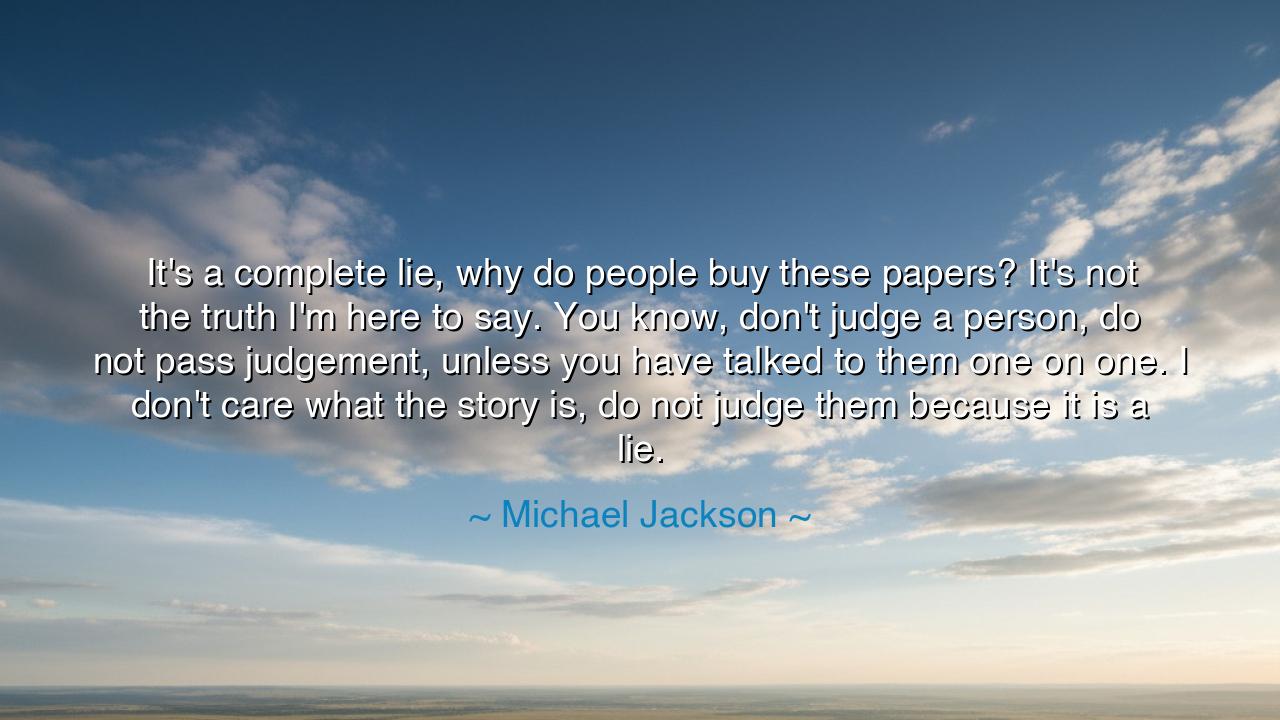
It's a complete lie, why do people buy these papers? It's not
It's a complete lie, why do people buy these papers? It's not the truth I'm here to say. You know, don't judge a person, do not pass judgement, unless you have talked to them one on one. I don't care what the story is, do not judge them because it is a lie.






"It's a complete lie, why do people buy these papers? It's not the truth I'm here to say. You know, don't judge a person, do not pass judgement, unless you have talked to them one on one. I don't care what the story is, do not judge them because it is a lie." These words from Michael Jackson, the King of Pop, speak to the deep and timeless wisdom of not judging others based on hearsay, rumors, or the distorted narratives that often surround public figures. Jackson, whose life was consistently under the microscope of public scrutiny, understood the immense power of the media and how easily falsehoods could be spun into truths by the press. But in his call to "not judge," he reminds us of an age-old principle: to know the truth of a person’s heart, one must approach them directly and engage with them without the distortion of external biases.
In the teachings of ancient wisdom, particularly in the philosophies of Socrates and Confucius, the idea of judgment is always linked to a deeper understanding of character and intentions. Socrates famously emphasized the importance of self-examination and wisdom before making any judgment about others. He asked, “Know thyself,” urging his followers to be deeply aware of their own flaws and biases before they judged the actions of others. Similarly, Confucius taught that before we judge another person, we must first ask ourselves how well we understand their circumstances and heart. Jackson’s words align perfectly with these teachings, for they remind us that truth and judgment are too sacred to be left to the hands of those who do not know the full story.
Consider the life of Socrates, who was sentenced to death for “corrupting the youth” of Athens. The charges against him were based on falsehoods—distortions of his character and his teachings. The Athenian authorities judged him not based on truth, but on a public narrative shaped by fear and misunderstanding. Yet Socrates stood firm, declaring that he had lived his life seeking only the truth. His death, though tragic, was a powerful example of how false judgments—based on incomplete knowledge or prejudice—can lead to disastrous consequences. In this context, Jackson’s call to not judge until one has spoken directly with a person reflects the wisdom of Socrates, who knew that true understanding could only come through direct engagement and introspection.
Similarly, Michael Jackson's own life was marked by continuous media scrutiny, much of which was based on distorted perceptions and falsehoods. Throughout his career, he was relentlessly pursued by rumors and scandal, often driven by a media machine more interested in selling stories than in uncovering the truth of his life. His admissions about the personal pain he endured, coupled with the public’s tendency to judge him without knowing the truth, reflect the power of narrative—how a story can be created around a person without ever truly understanding them. His plea to not judge others without engaging with them personally was not only a reflection of his own struggles but also a universal truth about the danger of accepting lies as truth.
The lesson here is clear and universal: to truly understand a person, we must first engage with them directly, without the filter of external narratives. Jackson’s words call us to recognize the power of media and public opinion, which often distort the reality of people’s lives. When we judge others based on what we hear or read, we are no different from those who judged Socrates or Jackson—based on assumptions and falsehoods. True wisdom lies in the ability to withhold judgment until we have sought the truth ourselves, through understanding, compassion, and direct experience.
In our own lives, we should strive to practice the same humility and caution that Michael Jackson urged. We must remind ourselves that truth is a living thing, not something to be constructed by the opinions of others. If we hear rumors or stories about someone, let us remember that those stories are often incomplete, distorted, or entirely false. Rather than rushing to judgment, let us take the time to listen, to ask questions, and to understand the whole picture. Judgment without understanding leads only to division, misunderstanding, and harm, while engagement with the truth fosters unity, compassion, and growth.
Let us also remember that judgment is not just a matter of how we view others, but how we view ourselves. Michael Jackson knew that people often judge him through a distorted lens, but he also understood the importance of self-awareness. Before we pass judgment on others, let us first ensure that we are not living under the weight of our own false beliefs and assumptions. As Socrates advised, let us first understand our own hearts before we attempt to understand others.
In conclusion, the wisdom of Michael Jackson calls us to look beyond the surface, to reject falsehoods, and to seek truth through direct engagement and understanding. We must not fall prey to the judgments of others or the stories they create. Instead, let us seek out truth for ourselves, recognizing that only through truth can we find peace, understanding, and the courage to live with authenticity and compassion. Just as Socrates and Jackson both knew, true wisdom comes not from judgment, but from knowing the truth through our own efforts, through listening, and through love.






AAdministratorAdministrator
Welcome, honored guests. Please leave a comment, we will respond soon